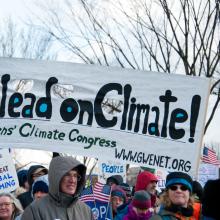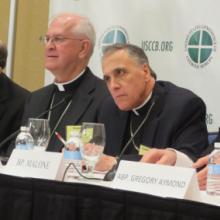Obama
BAN KI MOON has summoned the world's leaders to New York in September to talk about the climate—and in the process he's also summoned all of us who care about the planet's future. We'll be there in record numbers, for the largest demonstrations about global warming yet—and there will be, I think, an unavoidable edge of anger. Because calling these guys "leaders," at least on this issue, is by now a joke.
Take President Barack Obama, for instance. He ran for office promising, in almost biblical terms, that during his administration "the rise of the oceans would begin to slow." Installed in office, he summoned environmentalists to the White House where his staff informed them that he wouldn't be talking about climate change: "Green jobs" tested better in focus groups.
And President Obama was true to his word. He hardly ever talked about climate change: He summoned no political muscle to back attempts at a climate bill in the Senate, and he watched as the Copenhagen climate talks collapsed, the biggest foreign policy failure in many years.
When Obama run for president in 2012, he made it through the whole campaign—during the hottest year in U.S. history—without even mentioning global warming. And while he delayed half of the Keystone pipeline, he "expedited" approval of the southern section, boasting that his administration had built enough new pipelines to wrap around the equator. He has modest decreases in carbon emissions to herald—and massive increases in oil and gas drilling. On his watch the United States will pass Russia and Saudi Arabia as a hydrocarbon source.
THE TRANS-PACIFIC Partnership may be the largest free trade agreement you’ve never heard of. Or if you have heard of the TPP, it’s likely due to media reports about efforts by President Obama to fast-track the agreement through legislative hurdles. Still, details of the agreement and its secret negotiation process are sparse. Were it not for released drafts of the document and sub-chapters made available by the whistle-blowing site WikiLeaks, it is likely the general public would know little to nothing of the accord.
Building on the foundation of a 2006 economic partnership agreement adopted to encourage trade between Brunei, Chile, New Zealand, and Singapore, the TPP’s expansion of the agreement grows the number of participant nations to 12, adding Australia, Canada, Japan, Malaysia, Mexico, Peru, Vietnam, and the United States. The combined economic force of these nations would dominate global trade, representing roughly $28 trillion—nearly 40 percent—of the world’s gross domestic product.
But the magnitude of this trading pool isn’t what concerns most critics of the TPP. What is more troubling to labor, environmental, and health groups are the powers seemingly granted to multinational corporations by the agreement and the unilateral easing of climate change laws that serve to restrain industrial nations from disproportionate consumption and pollution.
Expanded corporate powers are nothing new for international trade agreements. The North American Free Trade Agreement (NAFTA) gave rise to a legal quagmire that has allowed Exxon Mobil to challenge Canadian offshore drilling regulations, Dow Chemical to bypass local guidelines to expand pesticide production and waste disposal in Mexico, and Eli Lilly to enforce U.S.-issued drug patents and prices outside the country. Previously, under World Trade Organization treaty guidelines, a corporate entity needed to persuade its host country to challenge the trade laws of another. Corporations could not directly litigate against a sovereign nation or its policies.
With Easter recess around the corner, immigration supporters are in full force with their advocacy plans. Efforts have taken a two-tier approach: some groups focus on Congressional action for meaningful and broad reform this year, while others are focusing on administration fixes to reduce deportations.
Recently, pressure has mounted on the Obama Administration, as groups attempt to stop the unjust deportations of non-criminal immigrants who have roots in the U.S. The Immigration Customs Enforcement (ICE) will soon reach its 2 millionth deportation under the Obama Administration. The rising volume of deportations has caused uproar amongst the immigrants’ rights community, as advocates highlight the moral crisis in communities with families facing separation from loved ones. Advocates are urging the president to use his executive powers to ease unjust deportations that cause needless pain and suffering.
Days after discussing the U.S. Catholic bishops’ fight over contraception with President Obama, Pope Francis met Monday with members of the Green family, the Oklahoma billionaires whose company, Hobby Lobby, took their challenge to Obama’s contraception mandate to the Supreme Court last week.
The pope met with Obama on Thursday for the first time, touching on some hot-button disputes between the White House and U.S. Catholic bishops.
I have a vivid memory of my first visit to Sing Sing Correctional Facility in upstate New York. Some young inmates were reading my book, The Soul of Politics, as part of a seminary program in the infamous prison, and they invited me to come discuss it with them. The warden gave me and about 50 young men several hours together, and I will never forget the comment one of them made: "Jim, most of us here are from just five or six neighborhoods in New York City. It's like a train that starts in my neighborhood, and you get on when you are 9 or 10 years old.
JUANA TOBAR SAYS she is waiting for a miracle from God. She’s the mother of four wonderful children and a grandmother of two young girls. Her husband, Carlos, a U.S. citizen, calls her the “glue of their family” and his soul mate. Juana has lived in North Carolina for more than 20 years and serves as an usher in her church, but in the coming weeks the Obama administration will be deciding whether or not to deport her back to Guatemala.
Juana’s case is not unusual. According to its own statistics, Immigration and Customs Enforcement (ICE) has deported approximately 400,000 immigrants per year since President Obama took office in 2009. In March, he’s set to reach the dubious marker of 2 million deportations, more than any other president. Many of us who work with immigrant communities are left asking: Why would a president—especially one who enthusiastically supports immigration reform that would give the undocumented a chance to stay in the country and earn citizenship—so aggressively deport the same immigrants who could be legalized through reform?
Our best guess is that when Obama entered office, his administration made a calculation that if they showed they were serious about enforcement, lawmakers would be more likely to come to the table and negotiate. That goodwill never materialized. Now, five years later, ICE is feeling increasing heat from immigrant advocates.
One of the key discrepancies between ICE and its critics is the question of who is being deported. In 2011, the administration issued a memo vowing to focus deportations on “convicted criminals,” a scary label until you realize how DHS defines the term. Immigrants commit crimes at much lower rates than the native born, so there are only so many serious criminals to find and deport. Thus, ICE has come to define “criminal” loosely, covering both violent felons and people who get a traffic ticket. A substantial number of those who are deported don’t count as “criminals” even under that definition. And many are the parents of U.S. citizens. In the first six months of 2011, for example, ICE deported nearly 50,000 parents of U.S. citizens—people like Juana Tobar.
SEVERAL YEARS AGO, before Congress passed the Affordable Care Act, many people were clear on the need to get health care for our brothers and sisters and joined in the push to reform the delivery system for health care in this country. When it was enacted, we were thrilled that those who had such difficulty getting even the most basic care for themselves and their children would finally have some health security.
But the notorious website problems—including the crashes, the inability to access it, the insurance programs that have been canceled, and the smaller-than-expected number of people who have been enrolled—have frustrated, discouraged and sometimes challenged us. This has been complicated by political bombast and in some cases, sadly, vicious character assassinations.
As people of faith, it is important not to be swept up in these problems, but to relentlessly pursue access to health care for the 48 million people who do not have health insurance today. We also need to remember that the ACA is more than a website. Think of the millions of young adults who can now stay on their parents’ insurance and the thousands of small businesses that have received tax credits for providing insurance to their employees.
The new rules that guarantee comprehensive insurance coverage, no barriers to preventive care, no pre-existing condition limits, and no lifetime limits on coverage have already made a huge difference in the lives of many families. The portion of the law that requires insurance companies to spend 80 to 85 percent of premium revenue on actual care rather than profits or dividends to shareholders will do much to make the cost of insurance more reasonable.
Energy policy and climate change action are inexorably linked, like two oxen in a yoke.
The trouble with this set-up is that while climate action tends to look straight ahead, energy policy is apt to veer off on any number of paths, some of them quite well-meaning, like job growth or “energy independence.”
Last night’s State of the Union address by President Obama was, I’m afraid, one such experience for climate action, which compared to the huge bull of energy issues is a yearling at best. The yoke between energy and climate did get mentioned by the president, but the yoke pressed toward economic growth, the paradigm which many argue is responsible for our ecological crisis in the first place. It’s enough to strain a vertebra.
It’s a new year, and Congress is back in session.
One of the top issues expected to be debated in 2014 is a hike to the federal minimum wage. 13 states have instituted wage increases. President Obama has supported raising the minimum wage throughout his presidency. Most recently, he shared his approval of new legislation proposed by Sen. Tom Harkin and George Miller (D-Calif.) that would raise the minimum wage to $10.10, up from it’s current $7.25.
Critics of the Harkin/Miller bill are quick to decry any wage increase. The usual arguments are trotted out to combat progressive pay for low-wage earners. Here are five commonly perpetuated myths about minimum wage. Hopefully, their exploration will shed a more accurate light on this contested issue.
I stood in line and waited until they called my number.
“Neeeext,” the woman behind the counter called!
The woman put out an energy that dared anyone to cross her, challenge her, even speak to her. She gave me a pile of papers to fill out “over there,” she waved her hands dismissively in the general direction of all the other losers sitting in rows of old school desks — the kind where the chair and the desk are attached. They were all fully engrossed in one task: filling out their unemployment insurance applications. I joined them.
Of course we weren’t losers, but it felt like we were. We were grown adults. We represented many races: white, black, Latino, and Asian. We represented a small fraction of the sea of people who were out of work at the height of the economic crisis. If you had come to us only weeks before we were school teachers and firemen, opera singers, Wall Street brokers, and justice advocates (like me). But now we were all numbers, experiencing the same humiliating moment together.
But, how much more humiliating it would have been to be thrown out of my apartment? How much more dehumanizing would it have been to become homeless or go without food?
PHYSICS IS IMPLACABLE—it won’t bend even to politics.
Which is why it comes as bad news to see the charts on U.S. production of fossil fuels. During the Obama years, even as the president has been touting his administration’s success in reducing our domestic carbon emissions, it turns out that we’ve been drilling, mining, and fracking for more oil, coal, and gas than ever before. In fact, we’ve passed Saudi Arabia in oil production and are about to pass Russia in oil and gas output combined; meanwhile our coal exports have reached new highs. We’ve become the world’s biggest fossil fuel producer.
Which means that, precisely in the years when it’s become clear how much damage climate change is doing—the years of Midwest drought, of Hurricane Sandy—the United States has been bucking physics. We’re going in exactly the wrong direction.
The White House might make two arguments in response. One, it’s not their fault: The oil boom in places like North Dakota is all private enterprise. But in fact Obama’s done much to grease the skids for this boom: He’s opened up big offshore tracts for drilling, and even let the oil companies into the Arctic. His Interior Department has held auctions for vast piles of Powder River Basin coal.
I was encouraged by the findings of U.S. District Court Judge Richard Leon on Monday who granted an injunction to plaintiffs Larry Klayman and Charles Strange that will temporarily stop the National Security Agency from continuing their data-gathering program that mines information from our mobile phone calls.
The injunction was issued because the judge believes that Klayman and Strange likely will win their lawsuit against the federal government, claiming that the phone record collection practice is an unconstitutional violation of personal privacy.
The whole storyline is made that much more dramatic since the otherwise secret program was leaked to the public by former NSA contract Edward Snowden, who is now on the run, seeking asylum in exchange for shared intelligence. And while some perceive Snowden as a hero of individual liberty, others vilify him as an enemy of the United States, much like any other terrorist. Interestingly, people’s opinions about the NSA — and, frankly, the Obama administration and the government as a whole — diverge in similar ways.
President Obama’s “selfie” with prime ministers Helle Thorning Schmidt of Denmark and David Cameron of Great Britain has been making the rounds on social media. Many of Obama’s detractors have taken the opportunity to criticize the President’s picture taking prowess, bringing on “Selfie-Gate.” Take John Kass of the Chicago Tribune, for example:
First lady Michelle Obama sits off to the side, somber, dignified, as the world remembers Mandela. Yet next to her like some goofy adolescent who hasn't yet been taught how to behave properly at a memorial service — her husband — is snapping a memorial to himself.
Hold on a minute there, Kass, because South Africa is teaching us a thing or two about how they “behave properly at a memorial service.” Sure they mourn.
But they also dance.
From the video and images that I’ve seen, there was festive atmosphere at Mandela’s memorial service. This leads me to wonder what “proper behavior” at this memorial service looks like.
After a closed-door session at their annual meeting in Baltimore this month, the U.S. Catholic bishops issued an unusual "special message" reaffirming their long-standing opposition to the Obama administration’s birth control insurance mandate.
On one level, the declaration and the united front were no surprise: The American church hierarchy has made opposition to the mandate a hallmark of its public lobbying efforts, framing the issue as an unprecedented infringement of religious freedom.
Several bishops even vowed to go to jail rather than comply with the mandate. Others threatened to shutter the church’s infrastructure of hospitals, charitable ministries, schools, and universities rather than accept a policy that they say would force Catholic employers to provide health insurance that covers sterilization and perhaps abortion-inducing drugs as well as contraception.












